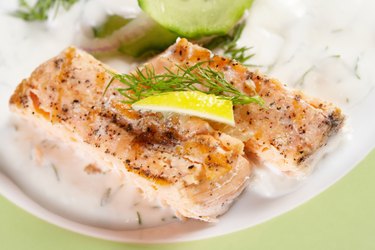
A wedge of lemon comes alongside virtually any plate of seafood served in a restaurant. For many diners, lemon is integral in fish recipes as a garnish, if not a featured component in the dish's preparation. Conversely, lemon's omnipresence in seafood service perplexes other diners. To them, it is a seemingly random inclusion that only obscures the fish's natural flavor. However, the marriage of fish and its citrus embellishment is a well-reasoned standard for several reasons.
Complementary Flavors
Video of the Day
The flavors of lemon and seafood are complementary. Most cooked fish and shellfish have a mild but distinct flavor. Enriching that flavor is a delicate task because of the proteins' mild attributes. Many garnishes overpower the flavor of the featured item. But fresh lemon juice, in moderation, has the right combination of strength and subtlety. The taste of lemon is an unmistakable beacon that is tart, sweet and fresh. At the same time, it is a crisp, clean flavor that allows other ingredients to shine.
Video of the Day
Reducing Flavor Intensity
In contrast, some diners like adding lemon because the juice, in excess, can obscure some of the seafood's flavor. Diners who enjoy seafood but do not always appreciate strong, fishy flavors prefer to use lemon to reduce the intensity of the taste. Whereas the complementary relationship between lemon and fish is only possible through a controlled, thoughtful squeeze of the wedge, tempering the fish flavor requires less precision since the goal is to shift the balance of flavors in the dish.
Digestive Aid
The acid in lemons is capable of breaking down the proteins in seafood the same way cooking does. Some fish recipes call for extended acidic marination to cook the item in place of heat. Ceviche is a seafood dish that chefs cook through acidic exposure rather than the application of heat. Applying the lemon's citric acid to fish, even if heat is featured in its preparation, breaks the proteins down further, aiding in digestion.
Appreciation
Sometimes, people add lemon to their seafood simply because they enjoy lemon. By comparison, some people add basil to their marinara sauce, while other people add oregano. It is purely a matter of taste. Diners could garnish their fish with tartar sauce or beurre blanc, but they choose lemon because they appreciate its flavor and its compatibility with seafood.
Deodorizer
Lemon garnishes also have a practical application that extend beyond taste. Strong fishy smells may linger on diners' fingers after the meal ends. The fish oils are hard to remove from skin without a chemical aid like soap. Citric acid is one chemical that successfully breaks the oils up, diminishing or covering the aroma altogether. By squeezing lemon during or after fish consumption, diners cut or replace the lasting reminder of their main course with the fruit's scent.